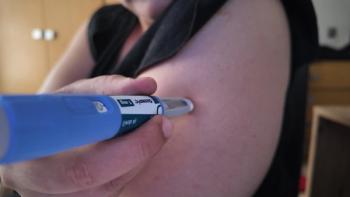
Nurses Show Interest in Learning About LGBT Patients With Cancer
A recent survey showed that nurses are willing to be trained in how to offer an affirmative healthcare experience to individuals who identify as lesbian, gay, bisexual, or transgender; however, only 4.7% were able to demonstrate knowledge of this patient community.
Nurses showed a willingness to learn about patients who identify as lesbian, gay, bisexual, and transgender (LGBT); however, they also reported there is a need for such training, according to survey results presented at the Oncology Nursing Society 43rd Annual Congress.
In scientific and health literature, sexual minorities include individuals who identify as lesbian, gay, bisexual, pansexual, asexual, or queer; gender minorities include those who identify as transgender, transman, transwoman, nonbinary, genderfluid, or queer.
“These terms allow us to encompass sexual orientations (in research) without limiting it at any point,” explained Chasity Burrows Walters PhD, RN, director, patient and caregiver engagement at Memorial Sloan Kettering (MSK) Cancer Center in New York, New York. “Sex is not gender. They are very different. This matters a lot to us in health care because when we think about biology we need to think about anatomy, and in oncology care, this matters for screening purposes.”
Population surveys have suggested between 5.2 and 9.5 million US adults identify as LGBT, but barriers to equitable health care are multifactorial, including negative experiences.
While research demonstrates there have been increasing efforts to educate nursing students in this area, other studies have shown that barriers still persist. For example, sexual and gender minorities have barriers to healthcare like discrimination, insurance, and provider/healthcare system insensitivity. Gender minorities also experience distress from discordance between gender and genitalia, lack of evidence for clinical decision making, and limited exposure, Walters said.
In addition, the LGBT population lacks data in the cancer space, despite the fact that there are overlapping risk factors that can lead to anal, breast, cervical, colorectal, endometrial, lung, and prostate cancers in this group. “We don’t have anything to [reference] to learn about the disparities and risks associated with these populations,” she added.
Therefore, Walters and colleagues aimed to understand oncology nurses’ knowledge, beliefs, and skills regarding LGBT patients to establish warranted training needs. They issued an online survey to 1253 health care professional at MSK, including 941 nurses, to evaluate LGBT healthcare knowledge, beliefs, communication behaviors, willingness to treat LGBT patients, behaviors encouraging LGBT disclosure, and perceived importance of LGBT sensitivity training.
The researchers included 7 items on knowledge adapted from published items; 12 items on beliefs adapted from the Sexual Orientation Beliefs Scale and Attitudes Toward Transgendered Individuals Scale, as well as published items; and 18 items on skills that were adapted from the Gay Affirmative Practice Scale, as well as quantitative and qualitative items added by the study team.
Notably, 81 survey participants identified as LGBT, and 810 (86.1%) said they had a friend or family member in the LGBT community.
In total, 86% of nurses surveyed had experience caring for individuals who identified as lesbian, gay, or bisexual, while 31% had experience with those who identified as transgender. However, only 4.7% of nurses were able to answer all knowledge items in the survey correctly, and about half identified 3 of the 7 answers correctly.
Higher knowledge scores appeared to be associated with favorable beliefs about sexual orientation and gender identity, favorable beliefs about LGBT healthcare, more open communication behaviors, greater encouragement regarding LGBT status disclosure, and greater perceived importance of LGBT sensitivity training.
The researchers noted these results are serving the foundation for the development of a communication skills training for nurses, and in the near future they will contribute to a mixed methods study comparing healthcare providers and LGBT patient preferences and perceptions regarding LGBT patient care.
“Across the board, we heard loud and clear from our nursing staff they want more training in this area,” Walters added.
Reference:
Walters C, Banerjee S, Staley J, Haviland K. Nurses’ knowledge, beliefs, and skills toward LGBT patients. Presented at: Oncology Nursing Society 43rd Annual Congress; May 17-20, 2018; Washington DC.
Newsletter
Knowledge is power. Don’t miss the most recent breakthroughs in cancer care.


































